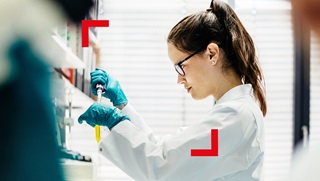
Change comes from fresh ideas and new perspectives. There is a lot of work to do in the off-grid fuel sector and this is where we focus. At Futuria Fuels, we're about the here and now and passionate about making change.
What’s in a name? rLPG, bioLPG, renewable propane are all terms used to describe sustainable liquid gas. Our parent company, SHV Energy, pioneered the introduction of bioLPG in 2018. Since then, it has proven to be an effective, sustainable alternative. By comparison to LPG sourced from fossil fuels, bioLPG results in around 80% less CO2.
The challenge is that, currently, bioLPG is made as a byproduct of other fuels. The process to make renewable diesel and Sustainable Aviation Fuel (SAF) creates a small quantity of bioLPG. For example, renewable diesel delivers around a 3-5% yield of bioLPG with current processes. We are proud to offer bioLPG sourced from these processes to customers in several markets in Europe.
We are also working with partners to develop processes that produce bioLPG on-purpose. We also need to research sustainable locally available feedstocks to deliver the highest yields of bioLPG (also known as renewable propane in many countries around the world). An alternative method of LPG production is synthetic or electric LPG, known as eLPG. This is similar to bioLPG but will use renewable electricity in the production of the fuel.
It’s important to note that, whichever method is used, these are true drop-in solutions. Customers will be able to use the rLPG in their existing equipment without any conversion or modification.


rDME is a liquid gas similar to LPG that is produced from renewable and recycled feedstock. Crucially, using existing technologies and a wide variety of renewable and recycled carbon feedstock, it is already possible to produce ‘on-purpose’ rDME today.
rDME can be blended with LPG, bioLPG or used on its own, unblended. This enables equipment which can be powered by LPG to work, with little to no modification, with the blend.
As with bioLPG, the first step to widespread adoption of rDME is on-purpose production. Acceleration is needed to expand the range of effective methods of production and deliver increasing volumes of this exciting fuel.
H2 is an exciting option for energy users as it does not produce CO2 when used.
The challenge for off-grid is that delivering H2 in compressed form is inefficient due to its poor volumetric energy density.
We are working with our partners to explore methods to deliver LPG and rLPG to our customers that can be converted into H2 at their location. Making this accessible, cost effective and viable will remain a key focus in the coming years.


Beyond sustainable fuel production, it’s essential that we consider other aspects of off-grid energy supply and usage.
Carbon capture is a technology which could have real value and benefits for industry.
We are exploring how small-scale carbon capture can help the off-grid sector to further reduce CO2 emissions.
If you can see something we’ve missed or can add an idea to the mix, we’re ready to hear it. Drop us a message below and we’ll get in contact as soon as possible.